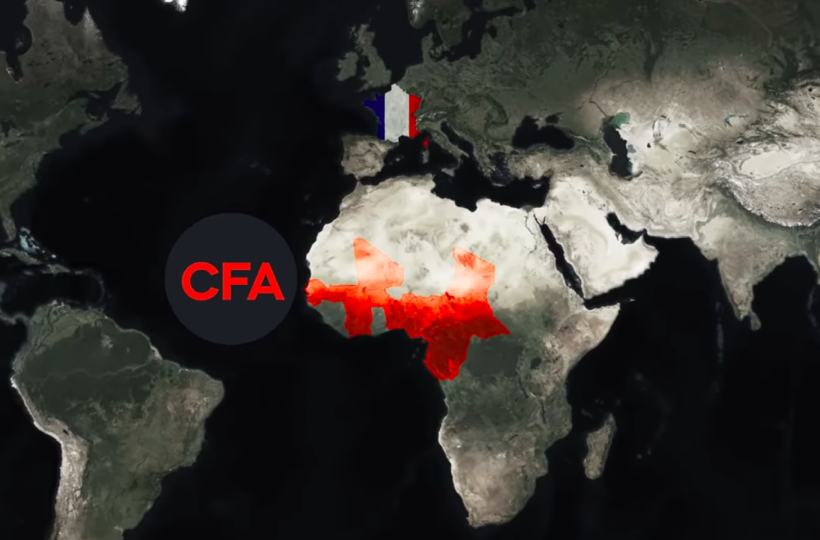On 16 September 2023, Mali, Niger and Burkina Faso signed the Liptako-Gourma Charter, establishing a new alliance between the three French-speaking African states of the Sahel. An alliance that laid the groundwork for even greater change.
In December, the leader of Niger’s revolutionary government announced on Niger’s national television the shared goal of Niger, Mali and Burkina Faso to establish not only a military and political alliance, but also a monetary one:
“Beyond the security ambit, our alliance must evolve in the political ambit and the monetary ambit”.
The three countries, and five others in the region, currently use the West African CFA franc, a currency linked to the euro and seen by critics as a legacy of French colonial rule.
Burkina Faso’s leader, Ibrahim Traoré, speaking on Burkinabe national television on the same days, also hinted at the economic alliance between the countries: “The Alliance of Sahel States is a defence alliance a priori, but it will evolve into an economic alliance and much more”.
In November 2023, the finance ministers of the three states issued a joint statement recommending the creation of a committee of experts to study the issue of economic union and monetary union. This is a historic initiative to re-establish their monetary sovereignty by creating a common currency called “Sahel”. This decision is a break with the agreements with France.
France remains a racist and colonial power that maintains a colonial relationship with 14 African countries (Cameroon, Chad, Gabon, Equatorial Guinea, Central African Republic, Republic of Congo, Benin, Burkina Faso, Ivory Coast, Guinea-Bissau since 2 May 1997, Mali until 1962 and since 1984, Niger, Senegal, Togo) through the CFA Franc, the currency imposed some 80 years ago. The currency was created at the behest of De Gaulle who, by granting false independence to African countries, in reality kept them under French influence when, on 26 December 1945, he ratified the Bretton Woods Agreements, rehabilitating the monetary mechanism that Hitler had imposed on France in 1939, allowing Germany to seize almost all of France’s wealth free of charge.
The CFA Franc was created in 1945 under the name Franc des Colonies Françaises d’Afrique, abbreviated FCFA, together with the CFP Franc, Franc des Colonies Françaises du Pacifique, which later became Change Franc Pacifique.
In 1958, the Franc des Colonies Françaises d’Afrique changed its name to “Franc de la Communauté Française d’Afrique”, later renamed the Communauté Financière Africaine (CFA). Today, the CFA franc represents two different currencies that are not interchangeable: the Franc of the African Financial Community (XOF) in the case of WAEMU, issued by the BCEAO (Banque Centrale des États de l’Afrique de l’Ouest) and the Central African Financial Cooperation Franc (XAF) for CEMAC issued by the BEAC (Banque des États de l’Afrique centrale).
Although the CFA franc is printed by the two respective central banks, in exchange for the fixed exchange rate regime, France requires these nations to remit to the French Treasury the equivalent of 50 percent of their exports. Under the pretext of guaranteeing the convertibility of the CFA franc, first into French francs and then into euros, France demanded 100% until 1963, then 65% and finally 50% from 2005 onwards of the foreign exchange reserves of all these countries. They must concentrate all their reserves in the Central Banks, which in turn transfer 50% of the reserves to the French Treasury (not to the French Central Bank) in the Count du Operation (of which there are three, one for each currency area) placed under state secrecy.
This means that the French Treasury acts as a credit institution, i.e. a bank, and has this availability through foreign exchange while African countries live their monetary independence under blackmail.
African countries have to pay 50% of their exports to the French Treasury in exchange for CFA francs and thus never have enough liquidity to develop.
This is why the revolutionary governments of Mali and Niger have made it known that they intend to put an end, in the coming months of 2024, to the colonial fiscal agreements concluded decades ago with France. In a joint communiqué, the two countries’ authorities explained their decision because of France’s “persistent hostile attitude” towards their countries and the “unbalanced nature of these agreements, which have resulted in a significant financial loss for Mali and Niger”.
“Our countries have realised that they have no other choice. We recall the meeting between Ouattara, Macron and the Nigerian foreign minister. At the end of the meeting, Macron declared that there will be no negotiations with Niger until Bazoum is released. You see how he was the one pulling the strings. Currency is an instrument of sovereignty and until you manage your currency, you are not sovereign,” Issoufou Boubacar Kado, a political scientist and public finance analyst, told local media.
5th Day of Work and Peoples’ Freedom. Africa-France: colonialism in the third millennium. Meeting with comrades of the PCI of Brescia, exponents of the Ivorian Popular Front, Bernard Doh and Richard Monsio, in which they expose the dynamics of French colonialism in South East and Equatorial Africa.






